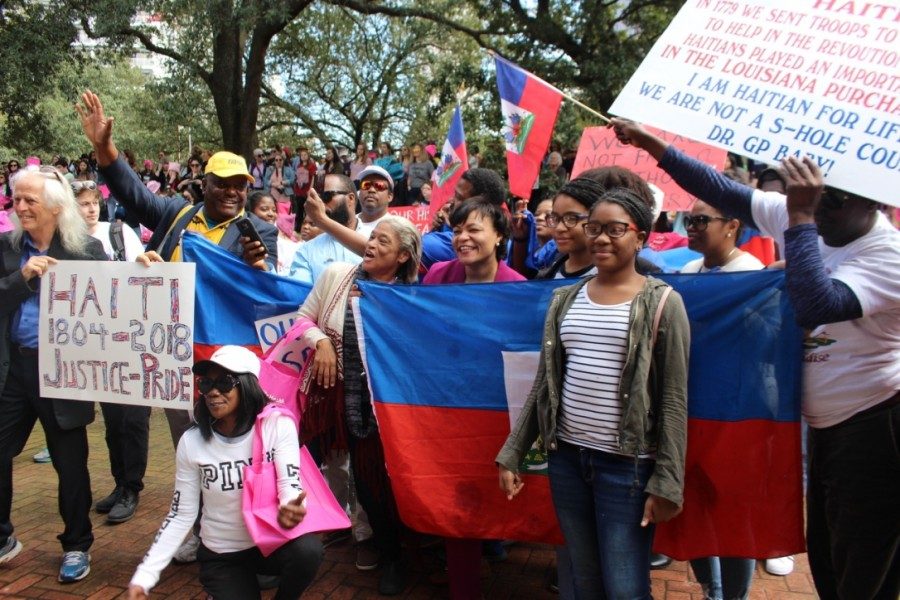Tulane community recognizes NOLA ties to Haiti
Sanjali De Silva | Senior Staff Photographer
NOLA residents take photo with mayor-elect Latoya Cantrell at the Women’s March.
Walking across New Orleans, it is easy to spot the plentiful ties the city shares with France. French fleurs-de-lis can be found capping fence posts, emblazoned on the city’s flag and featured on the Saint’s helmets. Roads like Toulouse Street or Napoleon Avenue bear the name of French historical figures. The city itself is named for a French town along the Loire River.
Representing Haiti and it’s culture in New Orleans #krewedukanaval #haitianhero pic.twitter.com/VE7Z04LJUc
— Jimmy Jean-Louis (@haitianhero) February 6, 2018
Though the French are recognized most publicly for their influence in New Orleans, many feel the French are not alone in shaping the city’s cultural landscape. According to several New Orleanians, substantial ties between New Orleans and Haiti are often missed, despite the extensive history shared by the two societies.
Now, residents like Nathalie Jeudy are calling for increased public recognition of the deep connections between Haiti and New Orleans. Jeudy, a recent graduate of the Tulane Law School Payson Center for Global Development, came to the U.S. from Haiti as a child and described the overwhelming similarities she has discovered between Haiti and the New Orleans area.
“Everything is similar — the Latin architecture, the Creole cottages, the Catholic cathedrals, the city squares, the parishes and even the way the food is prepared with many different spices from different cultures,” Jeudy said. “There’s also a lot of shared inefficiency and natural disasters. There are a lot of issues like flooding where people can’t rely on formal structures to help them out, so they have to depend on each other.”
It is likely to be the loudest love song to Haiti to emanate from New Orleans in many decades https://t.co/sXceYWN15a
— The New York Times (@nytimes) February 4, 2018
In addition to architectural overlap and natural disasters, Haiti has also played an notable role in American history. Marky Jean-Pierre, a Tulane professor who emigrated from Haiti to the U.S. more than 20 years ago, explained the significance of the Haitian Revolution in the Louisiana Purchase, a historic deal in which the U.S. purchased more than 800,000 acres of French land, including New Orleans.
“France sent a huge army to Haiti to quash the revolutionary army in Haiti,” Jean-Pierre said. “What France had in mind was to have the army make its way to New Orleans, to occupy Louisiana and to build a strong empire before facing the United States. The Haitian revolution completely quashed the French forces. It is because of that Napoleon decided to sell Louisiana to the U.S.”
Recently, Tulane has begun taking steps to strengthen students’ familiarity with Haiti and its diaspora. Annie Gibson, the associate director of intercultural learning at Tulane’s Center for Global Education, will be leading Tulane’s first summer program to focus on Haitian culture.
“We are running a summer program to the Dominican Republic with a focus on Haitian-Dominican race, identity and immigration,” Gibson said. “… We’re looking at how race and immigration works between Haiti and the Dominican Republic, how politics and economics work on this one island. This program is a way of helping students think about a new understanding of their home in a global dimension.”
Both Jean-Pierre and Jeudy expressed dissatisfaction with the lack of credit Haiti receives on the global stage, including recent disparaging comments made by President Trump about Haiti.
“The world has a way of seeing places in terms of the beautiful things you have,” Jean-Pierre said. “In places where there is poverty, where there is limited education, they forget them. I think the president is misinformed about Haiti, what it means for the history of the world … We are talking about the greatest free nation in the world denigrating the first country to fight for freedom from slavery.”
In spite of current conditions, Jean-Pierre spoke of a positive future for the Haitian people.
“We are not defined by those limited socioeconomic conditions,” Jean-Pierre said. “I believe the day shall come when this country will actually tell the world what Haiti means for the history of humanity.”
Your donation will support the student journalists of Tulane University. Your contribution will allow us to purchase equipment and cover our annual website hosting costs.




Leave a Comment